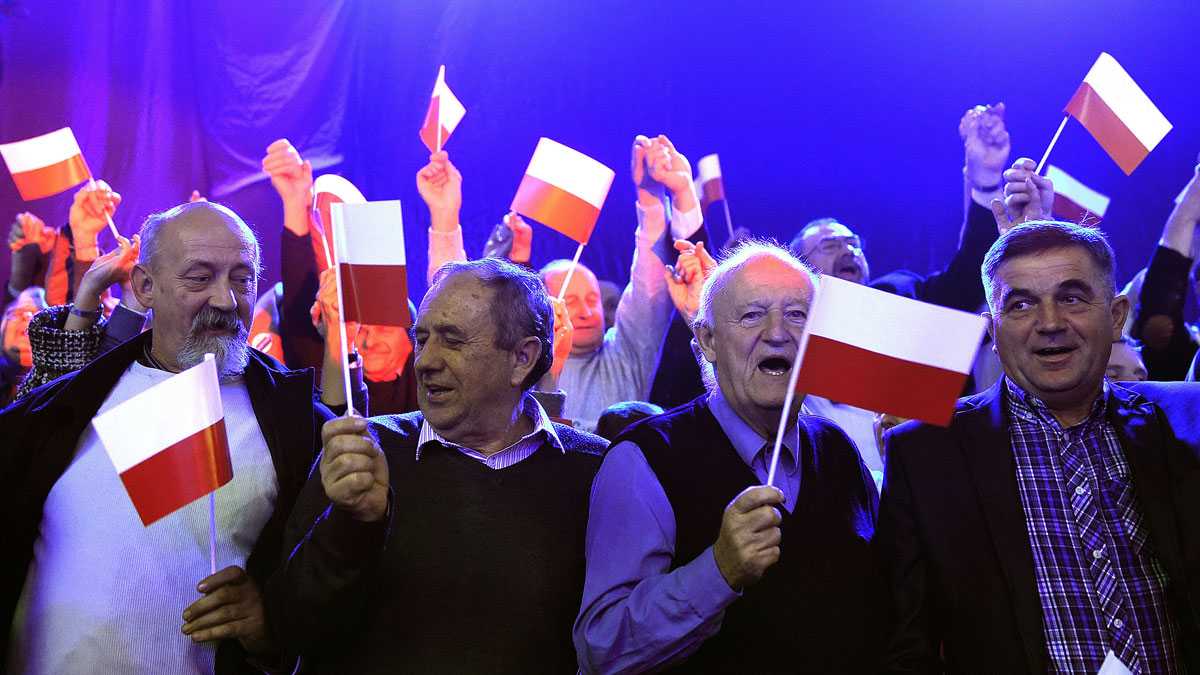Poland election: what Law and Justice win means for Europe
Party leader Jaroslaw Kaczynski famously stated that migrants bring 'various types of parasites' to Europe

A free daily email with the biggest news stories of the day – and the best features from TheWeek.com
You are now subscribed
Your newsletter sign-up was successful
Poland looks set to have a new right-wing government following Sunday's elections. With 37.7 per cent of the vote in the exit polls, the Law and Justice (PiS) party dwarfed the Civic Platform party, which had dominated Poland's political life for eight years.
The Civic Platform party appears to have finished the race with 23.6 per cent of the vote and only 137 out of the 460 seats in the lower house of parliament. Its image has also been badly tarnished; an eavesdropping scandal, plans to hike up the retirement age and a "listless campaign" all spelled out the end for Civic Platform. "It wasn't promises, but the degeneration of the ruling camp that was the main reason for PiS's success," says Norbert Maliszewski, a political scientist with the University of Warsaw, for Politico Europe.
Who are the key players?
The Week
Escape your echo chamber. Get the facts behind the news, plus analysis from multiple perspectives.

Sign up for The Week's Free Newsletters
From our morning news briefing to a weekly Good News Newsletter, get the best of The Week delivered directly to your inbox.
From our morning news briefing to a weekly Good News Newsletter, get the best of The Week delivered directly to your inbox.
Poland's current prime minister, Ewa Kopacz, leader of Civic Platform, looks set to be replaced by Beata Szydlo, the deputy leader of PiS. However, the real PiS string-master is Jaroslaw Kaczynski, twin brother of former president Lech Kaczynski, who was killed in a plane accident in 2010.
Jaroslaw Kaczynski is the PiS leader and the man who put Szydlo forward as the face of the party, knowing that otherwise his winning margins would be slim as one of the country's least-liked politicians, says Politico Europe. He infamously claimed that refugees were bringing "cholera to the Greek islands, dysentery to Vienna, various types of parasites". Many commentators have compared him with Hungarian Prime Minister Viktor Orban, with both brandishing particularly nationalist politics.
What does this mean for Poland?
Politically, it's a shift from centre-right to a more clear-cut right-wing government. PiS is dominated by nationalism and anti-immigration rhetoric and has staunchly pro-Church and family values. The win also means that Poland's political scene will be dominated by PiS, whose candidate Andrzej Duda also won the presidential elections in May against incumbent Bronislaw Komorowski. Economy-wise, PiS is promising to "limit the growth of foreign retail outlets, to impose a new bank tax and to force banks to absorb losses in turning hundreds of thousands of expensive mortgages denominated in Swiss francs into zloty [Poland's national currency] loans", says Politico Europe.
A free daily email with the biggest news stories of the day – and the best features from TheWeek.com
What about Europe?
PiS is Eurosceptic at heart and especially wary of Germany. It is even more sceptical of Russian influences, preferring instead to foster a closer relationship with Nato. Also, according to Politico, PiS wants to build stronger ties with Central Europe. Witold Waszczykowski, a PiS MP tipped as a potential foreign minister, said "the focus will be region, region, and once again region".
In the UK, David Cameron has in the past "expressed support for Law and Justice and has included his Conservative party in the same European parliamentary grouping", says The Guardian. However, close to one million Poles live and work in Britain, which means PiS is unlikely to back a potential Brexit or European free movement restrictions.
-
 Corruption: The spy sheikh and the president
Corruption: The spy sheikh and the presidentFeature Trump is at the center of another scandal
-
 Putin’s shadow war
Putin’s shadow warFeature The Kremlin is waging a campaign of sabotage and subversion against Ukraine’s allies in the West
-
 Media: Why did Bezos gut ‘The Washington Post’?
Media: Why did Bezos gut ‘The Washington Post’?Feature Possibilities include to curry favor with Trump or to try to end financial losses
-
 Epstein files topple law CEO, roil UK government
Epstein files topple law CEO, roil UK governmentSpeed Read Peter Mandelson, Britain’s former ambassador to the US, is caught up in the scandal
-
 Iran and US prepare to meet after skirmishes
Iran and US prepare to meet after skirmishesSpeed Read The incident comes amid heightened tensions in the Middle East
-
 Israel retrieves final hostage’s body from Gaza
Israel retrieves final hostage’s body from GazaSpeed Read The 24-year-old police officer was killed during the initial Hamas attack
-
 China’s Xi targets top general in growing purge
China’s Xi targets top general in growing purgeSpeed Read Zhang Youxia is being investigated over ‘grave violations’ of the law
-
 Panama and Canada are negotiating over a crucial copper mine
Panama and Canada are negotiating over a crucial copper mineIn the Spotlight Panama is set to make a final decision on the mine this summer
-
 Why Greenland’s natural resources are nearly impossible to mine
Why Greenland’s natural resources are nearly impossible to mineThe Explainer The country’s natural landscape makes the task extremely difficult
-
 Iran cuts internet as protests escalate
Iran cuts internet as protests escalateSpeed Reada Government buildings across the country have been set on fire
-
 US nabs ‘shadow’ tanker claimed by Russia
US nabs ‘shadow’ tanker claimed by RussiaSpeed Read The ship was one of two vessels seized by the US military